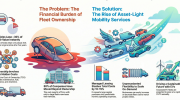Otomobil dünyasında iki isim sıklıkla ön plana çıkar: Toyota ve Mitsubishi. Her iki marka da otomotiv pazarında önemli bir yer edinmiş ve farklı tercihlere ve ihtiyaçlara hitap eden çeşitli araçlar sunmuştur. Ancak hangisinin daha iyi olduğu sorusuna gelince, cevap sanıldığı kadar basit değildir. Her markanın kendine özgü özelliklerini, güçlü ve zayıf yönlerini inceleyerek birbirlerine göre nasıl sıralandıklarını görelim.
Marka Genel Bakışı
1937 yılında kurulan Toyota, güvenilirliği ve yenilikçiliğiyle ünlüdür. Marka, zaman içinde değerini koruyan dayanıklı araçlar üretmesiyle tanınır. Özellikle Toyota, Prius'un çevre dostu sürüşe öncülük etmesiyle hibrit teknolojide öncü olmuştur.
Mitsubishi ise 1870'lere dayanan köklü bir geçmişe sahiptir. Başlangıçta bir ticaret şirketi olan Mitsubishi, 1910'larda otomotiv sektörüne adım attı. Mitsubishi, özellikle Outlander ve Eclipse Cross gibi SUV ve crossover segmentlerindeki benzersiz ürün gamıyla tanınır. Ayrıca, sportif imajlarını şekillendiren ralli yarış dünyasında da güçlü bir varlığa sahiptirler.
Performans ve Güvenilirlik
Performans, otomobil alıcıları için genellikle belirleyici bir faktördür. Toyota araçları, genel olarak güvenilirlikleriyle takdir edilmektedir. Markanın kapsamlı test ve kalite kontrol önlemleri, tüketicilerin onları hayal kırıklığına uğratmayacak bir ürün almasını sağlar. Toyota Camry ve Corolla gibi modeller, güvenilirlik anketlerinde sürekli olarak üst sıralarda yer almaktadır.
Mitsubishi araçları, güvenilirlik açısından evrensel olarak beğenilmese de farklı bir çekicilik sunuyor. Markanın turboşarjlı motorları, özellikle Mitsubishi Lancer Evolution gibi modellerde, sürüş tutkunlarına hitap eden heyecan verici bir performans sunuyor. Ancak Mitsubishi'nin genel güvenilirlik derecelendirmeleri Toyota'nın gerisinde kalıyor ve bu durum uzun ömürlü araç arayan alıcıları etkileyebilir.
Yakıt Verimliliği
Günümüzün çevre bilincine sahip ortamında yakıt verimliliği en önemli unsurdur. Toyota bu alanda önemli ilerlemeler kaydetmiştir ve ürün gamında hibritler ve yakıt tasarruflu otomobiller hakimdir. Toyota Prius, galon başına etkileyici kilometre değerleriyle rakipsiz bir çevre dostu olma sembolü olmaya devam etmektedir.
Mitsubishi, Outlander PHEV gibi yakıt verimliliği yüksek modeller de sunuyor; bu modelde plug-in hibrit seçeneği sunuluyor. Ancak Toyota'nın kapsamlı hibrit teknolojisi ve sürdürülebilirliğe olan bağlılığı, genel olarak yakıt verimliliğinde ona üstünlük sağlıyor.
Fiyatlandırma ve Değer
Fiyatlandırma söz konusu olduğunda Mitsubishi genellikle kendisini daha uygun fiyatlı bir seçenek olarak konumlandırıyor. Markanın araçları genellikle Toyota muadillerine göre daha düşük başlangıç fiyatlarıyla geliyor. Bu uygun fiyat, bütçesine dikkat eden tüketiciler için cazip olabilir.
Ancak Toyota araçlarının yeniden satış değerleri genellikle daha yüksektir. İlk yatırım daha fazla olabilir, ancak uzun vadeli değer genellikle maliyeti haklı çıkarır. Alıcılar, Toyota'larının değerini Mitsubishi modellerine göre daha iyi koruyacağını bekleyebilirler; Mitsubishi modelleri daha hızlı değer kaybedebilir.
Güvenlik Derecelendirmeleri
Güvenlik, birçok alıcı için önemli bir husustur․ Toyota, gelişmiş güvenlik özellikleri ve teknolojileri sayesinde ürün gamında sürekli olarak yüksek güvenlik puanları almaktadır․ Adaptif hız sabitleyici ve şerit takip asistanını içeren Toyota Safety Sense paketi, birçok modelde standart olarak sunulmakta olup sürücü ve yolcu güvenliğini artırmaktadır․
Mitsubishi de güvenliğe önem veriyor, ancak derecelendirmeleri genellikle Toyota'nınki kadar mükemmel değil. Outlander gibi modeller çarpışma testlerinde iyi performans gösterse de, Mitsubishi'nin ürün gamındaki genel güvenlik teknolojisi Toyota'nın sunduğu kapsamlı sistemlerle uyuşmayabilir.
Son Karar
Toyota ile Mitsubishi arasında karar vermek nihayetinde kişisel tercihlere ve önceliklere bağlıdır. Güvenilirlik, ikinci el değeri ve son teknoloji sizin için en önemli şeylerse, Toyota muhtemelen daha iyi bir seçimdir. Tersine, uygun fiyatlı ve sportif bir görünüm arıyorsanız, Mitsubishi doğru tercih olabilir.


